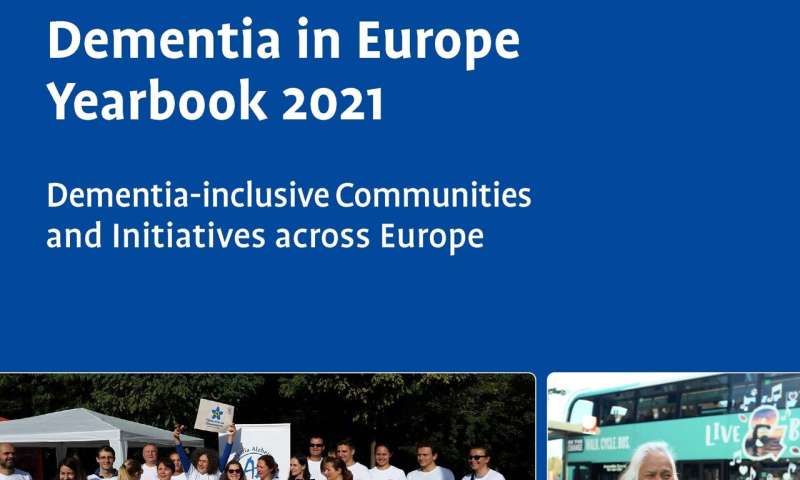Alzheimer Europe report outlines dementia-inclusive activities across Europe

- The 2021 Dementia in Europe Yearbook highlights that people with dementia, carers and supporters need to be more involved in the development, implementation and monitoring of dementia-inclusive initiatives and societies than is currently the case in many countries.
- It stresses that national, regional and local governments should provide funding for projects and initiatives to create dementia-inclusive societies.
- It also recommends that national, regional and local governments look to existing work in this area, such as that of the World Health Organization, the 2nd Joint Action on Dementia and the World Dementia Council, to inform their own practices and initiatives.
- It notes that structured and continuous monitoring and evaluation of dementia-inclusive societies should be undertaken, particularly for cities and municipalities calling themselves dementia inclusive, using a European evaluation framework, or even a global one.
Luxembourg, 22 March 2022 – At an online European Parliament Workshop entitled "Prioritising dementia in European policies on care, disabilities and equalities", Alzheimer Europe launched its 2021 Dementia in Europe Yearbook dedicated to dementia-inclusive communities and initiatives. The Yearbook examines activities undertaken across Europe which aim to create societies which support people with dementia, their families, carers and supporters to continue living as well as possible in their communities.
The report notes that, since 2015, there have been a number of European and international policy developments, including the EU's second Joint Action on Dementia, the World Health Organization's Global Action Plan on the Public Health Response to Dementia 2017-2025, and World Dementia Council reports on the subject. These have helped prioritise dementia-inclusive initiatives and communities, as have the additional resources and materials which have been developed to support their implementation. Common themes across these areas of work include awareness-raising amongst the public, anti-stigma campaigns, inclusive communities and the involvement of people with dementia, their carers and supporters in decision-making.
Furthermore, Alzheimer Europe collated examples of good practice provided from its members, who shared examples which could potentially be replicated and spread across Europe.
The report shows an extensive amount of work being undertaken across Europe, in the majority of cases, led by national Alzheimer associations. Governments (at different levels) appear to be taking on a a greater role (whether through funding or participation) in areas including awareness raising and dementia-inclusive schemes.
However, there remain gaps across Europe, as well as a number of areas for improvement. For example, the involvement of people with dementia, their carers and supporters remains highly variable, whilst the monitoring and evaluation of the impact of programmes is inconsistent. Taking these points into consideration, the 2021 Yearbook makes the following recommendations:
- People with dementia, carers and supporters should be involved in the development, implementation and monitoring of dementia-inclusive initiatives and societies.
- National, regional and local governments should provide sustainable and ongoing funding for projects and initiatives to create dementia-inclusive societies.
- National, regional and local governments should utilise the findings from existing work in the development and implementation of their own dementia-inclusive societies and initiatives, including that of the World Health Organization, the second Joint Action on Dementia and the World Dementia Council.
- Structured and continuous monitoring and evaluation of dementia-inclusive societies should be undertaken, particularly for cities and municipalities which self-describe as being dementia inclusive, etc. using a universal or at least European evaluation framework.
Commenting on the publication of the report, Alzheimer Europe's Executive Director, Jean Georges, stated:
"We are delighted to see the progress that has been made in recent years on dementia-inclusive initiatives. Dementia-inclusive communities and initiatives are an essential component in ensuring that people with dementia, their families and carers are able to live well with the condition. It is encouraging to see such a wide variety of initiatives taking place at a local, regional and national level and the important role played by our members across Europe."
"However, whilst this progress is welcome, there remain significant differences across Europe as to the development and uptake of these initiatives. People with dementia need to be involved to a greater degree in the decisions which affect them, whilst governments must commit to providing sustainable financing and resources to support dementia-inclusive initiatives across Europe."
The full report can be accessed on the website of Alzheimer Europe at: www.alzheimer-europe.org/repor … nclusive-communities
For further information, contact: Jean Georges, Executive Director, Alzheimer Europe, 14, rue Dicks, L-1417 Luxembourg, Tel.: +352-29 79 70, Fax: +352-29 79 72, jean.georges@alzheimer-europe.org, www.alzheimer-europe.org
More information:
www.alzheimer-europe.org/repor … nclusive-communities
Notes to editors: Alzheimer Europe is the umbrella organisation of national Alzheimer associations and currently has 37 member organisations in 33 European countries. The mission statement of the organisation is to change perceptions, practice and policy to ensure equal access of people with dementia to a high level of care services and treatment options.
In early 2021, Alzheimer Europe surveyed its members, asking about the work and activities taking place in their countries and gathering information on the themes and details of initiatives and programmes across Europe. In particular, the survey sought to understand the current policy context of dementia inclusive initiatives across Europe, including crucial elements such as stakeholder involvement, funding, objectives and evaluation. A total of 27 responses were received from 24 countries.
Provided by Alzheimer Europe